
Journal of Commutative Algebra
Scope & Guideline
Exploring New Dimensions in Algebraic Research
Introduction
Aims and Scopes
- Commutative Algebra:
The journal primarily publishes research centered around commutative algebra, covering topics such as ideals, rings, modules, and their applications in algebraic geometry and number theory. - Homological Aspects:
A significant focus is on homological methods in commutative algebra, including topics related to syzygies, resolutions, and cohomology, which are crucial for understanding the structure of modules over rings. - Geometric Applications:
Research that connects commutative algebra with geometry, particularly algebraic geometry, is prevalent, emphasizing the interplay between algebraic structures and geometric properties. - Computational Techniques:
The journal also highlights computational aspects of commutative algebra, including algorithms and numerical methods for solving algebraic problems. - Theoretical Developments:
New theoretical frameworks and results in the area of commutative algebra, including advancements in the understanding of Gorenstein rings, Cohen-Macaulay properties, and related concepts, are regularly featured.
Trending and Emerging
- Gorenstein and Cohen-Macaulay Rings:
There is a noticeable increase in research related to Gorenstein and Cohen-Macaulay rings, with a focus on their properties, applications, and connections to algebraic geometry, indicating a growing interest in these specialized areas. - Differential Algebra and Modules:
Emerging themes around differential modules and their applications in algebraic structures are gaining traction, showcasing a blend of algebra and analysis. - Computational Algebraic Geometry:
The intersection of commutative algebra with computational algebraic geometry is increasingly prominent, with researchers exploring algorithmic approaches to solving algebraic problems. - Higher Homological Dimensions:
The study of higher homological dimensions and their implications in both algebra and geometry is on the rise, reflecting a deeper exploration of the relationships between these fields. - Syzygies and Resolutions:
Research on syzygies and resolutions, particularly in relation to edge ideals and monomial ideals, is trending, emphasizing their importance in both theoretical and computational contexts.
Declining or Waning
- Classical Ideal Theory:
Research focusing solely on classical ideal theory appears to be diminishing, as newer methodologies and broader perspectives are being adopted, reducing the emphasis on traditional aspects. - Basic Properties of Rings:
Studies that concentrate on the fundamental properties of rings without connecting to broader applications or modern theories are becoming less common, suggesting a shift towards more complex and applied topics. - Elementary Algebraic Techniques:
Papers that employ only elementary techniques without integrating advanced methods or applications are less frequently published, reflecting a trend towards more sophisticated approaches in research.
Similar Journals
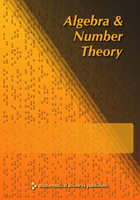
Algebra & Number Theory
Connecting Scholars Through Cutting-Edge Mathematical InsightsAlgebra & Number Theory, published by Mathematical Science Publications, stands at the forefront of mathematical research, particularly in the fields of algebra and number theory. With an ISSN of 1937-0652 and E-ISSN 1944-7833, this esteemed journal provides a dedicated platform for the dissemination of cutting-edge theoretical advances and practical applications. It has achieved a Q1 category ranking in both algebra and number theory according to the 2023 quartiles, reinforcing its critical role in shaping contemporary mathematical discourse. The journal serves as an essential resource for researchers, professionals, and students alike, offering insights into diverse mathematical methodologies and fostering open dialogue among scholars. Although it does not provide open access, its robust impact factor reflects the high quality and relevance of its published work. Based in the United States at the University of California, Berkeley, the journal's commitment to excellence continues to attract contributions that push the boundaries of mathematical understanding.

Collectanea Mathematica
Fostering excellence in the diverse world of mathematics.Collectanea Mathematica is a distinguished academic journal published by SPRINGER-VERLAG ITALIA SRL, dedicated to the field of mathematics, with a specific focus on both applied and theoretical aspects. Renowned for its rigorous peer-review process, the journal aims to advance knowledge in various mathematical disciplines, showcasing high-quality research that significantly contributes to the understanding of mathematical principles. With an impressive impact factor, and categorized in Q1 and Q2 quartiles for miscellaneous and applied mathematics respectively, Collectanea Mathematica plays a vital role in the academic community, catering to researchers, professionals, and students alike. The journal spans its convergence years from 2006 to 2024, reflecting a rich history of excellence and innovation in mathematical literature. With its strategic position within the Scopus rankings, it remains a pivotal resource for those seeking to stay at the forefront of mathematical research.

Analele Stiintifice ale Universitatii Ovidius Constanta-Seria Matematica
Connecting Ideas and Insights in the World of MathematicsAnalele Stiintifice ale Universitatii Ovidius Constanta-Seria Matematica is a prominent open-access journal established by OVIDIUS UNIV PRESS in Romania, dedicated to advancing the fields of mathematics, specifically in Analysis and Applied Mathematics. Since its inception, the journal has emphasized the dissemination of high-quality research, making it accessible to a global audience. With an ISSN of 1224-1784 and E-ISSN 1844-0835, it has positioned itself within the academic community, achieving a respectable Q3 ranking in both analysis and applied mathematics in 2023, reflecting its commitment to rigorous scholarship. The journal spans a considerable publication window from 2009 to 2024, catering to the ongoing developments in mathematical sciences and their applications. Researchers, professionals, and students alike will find valuable insights and contributions that enrich their understanding and foster collaboration within the mathematical community. The journal's headquarters is based at the Faculty of Mathematics & Computer Science, Bulevardul Mamaia 124, Constanta, Romania.
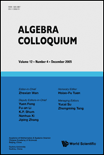
ALGEBRA COLLOQUIUM
Fostering a Community of Algebra Enthusiasts and ExpertsALGEBRA COLLOQUIUM is a prominent journal dedicated to advancing the field of mathematics, specifically focusing on Algebra and Number Theory as well as Applied Mathematics. Published by World Scientific Publishing Co Pte Ltd, this journal is based in Singapore and has been a cornerstone in mathematical research since its inception in 1996, with an anticipated convergence through 2024. With an ISSN of 1005-3867 and E-ISSN of 0219-1733, it features rigorous peer-reviewed papers that cover a diverse range of topics within its scope. Reflecting its quality, Algebra Colloquium is ranked in the Q3 quartile in both Algebra and Number Theory as well as Applied Mathematics, indicating its significance amidst a competitive publication landscape. Researchers, professionals, and students looking to stay at the forefront of mathematical innovation will find a wealth of knowledge and research insights within these pages, making it an essential resource for anyone committed to deepening their understanding of algebraic concepts and techniques.

Representation Theory
Pioneering Research in Mathematical RepresentationRepresentation Theory is a premier scholarly journal published by the American Mathematical Society, dedicated to the rigorous exploration and advancement of the field of representation theory. Since its inception in 1996, the journal has established itself as a crucial platform for disseminating groundbreaking research that delves into the algebraic and geometric structures influencing various mathematical forms. With an impressive impact factor that places it in the prestigious Q1 category of Mathematics (miscellaneous) as of 2023, Representation Theory ranks among the top publications in its domain, currently positioned at #62 out of 90 in Mathematics on Scopus. This journal caters to a diverse audience of researchers, professionals, and students, providing access to high-quality articles that foster an understanding of complex concepts and stimulate ongoing discourse. As a non-open access journal, it remains a vital resource, contributing significantly to the academic community and encouraging further developments in the fascinating world of representation theory.
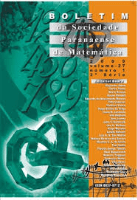
Boletim Sociedade Paranaense de Matematica
Unlocking the Future of Mathematical InquiryBoletim Sociedade Paranaense de Matematica is a distinguished journal within the field of Mathematics, published by the Sociedade Paranaense de Matemática in Brazil. With an ISSN of 0037-8712 and an E-ISSN of 2175-1188, this journal has been committed to fostering open access to mathematical research since 2002, ensuring that cutting-edge research is readily available to the academic community. Operating within the diverse landscape of mathematical studies and ranked Q3 for 2023 in the category of Mathematics (Miscellaneous), the journal serves as a platform for innovative contributions and discussions. It ranks 192nd out of 399 in the Scopus database for General Mathematics, reflecting its steady involvement in the global academic dialogue. The Boletim resides at JD AMERICAS, CAIXA POSTAL 19081, CURITIBA PR 81531-990, Brazil, and aims to connect researchers, practitioners, and students by promoting high-quality research and dissemination of mathematical knowledge. By bridging diverse mathematical theories and applications, the journal not only enhances understanding of the discipline but also drives future research directions.

New York Journal of Mathematics
Fostering innovation in the world of mathematics.New York Journal of Mathematics is a prominent open-access journal, published by the ELECTRONIC JOURNALS PROJECT, dedicated to advancing the field of mathematics through the dissemination of groundbreaking research. Since its inception in 1996, the journal has evolved into a valuable resource for researchers, educators, and students, particularly in the realm of general mathematics. As of 2023, it proudly holds a Q2 classification in the Mathematics (miscellaneous) category, reflecting its growing impact and reach within the academic community, despite being ranked at the 31st percentile overall. With its commitment to open access since 2022, the journal ensures that high-quality mathematical research is readily available to a global audience, fostering collaboration and innovation. Researchers interested in contributing to this dynamic field will find the journal a vital platform for sharing their findings and engaging with fellow mathematicians around the world.

Forum of Mathematics Sigma
Innovative research, limitless possibilities.Forum of Mathematics Sigma is a premier open access journal published by Cambridge University Press that has been at the forefront of mathematical research since its inception in 2013. With a strong emphasis on advancing the fields of mathematics, the journal consistently achieves Q1 rankings across multiple categories, including Algebra and Number Theory, Analysis, and Computational Mathematics. This distinction highlights its impact and relevance within the scholarly community. The journal prides itself on providing a platform for innovative research, fostering collaboration among researchers and practitioners across various mathematical disciplines. Open access publication ensures that cutting-edge findings are widely available to readers globally, enhancing the dissemination of knowledge. With an address in the heart of Cambridge, England, Forum of Mathematics Sigma is dedicated to promoting high-quality research and making significant contributions to the development of mathematics.
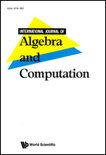
INTERNATIONAL JOURNAL OF ALGEBRA AND COMPUTATION
Advancing Mathematical Insights Through Algebraic InnovationThe INTERNATIONAL JOURNAL OF ALGEBRA AND COMPUTATION, published by WORLD SCIENTIFIC PUBL CO PTE LTD, is a prominent platform in the field of mathematics, specifically focusing on algebraic structures and computational methods. With a publication history dating back to 1996 and converging to 2024, this journal has established a significant presence within the academic community, as reflected in its Q2 category ranking in Mathematics and its position in the Scopus 45th percentile for General Mathematics. Although it does not offer Open Access, researchers can access a wealth of original research articles, comprehensive reviews, and groundbreaking findings that contribute to the advancement of mathematical theory and its applications. This journal not only serves as an invaluable resource for mathematicians but also encourages interdisciplinary research by appealing to professionals and students alike who seek to deepen their understanding of algebra and computation methodologies.
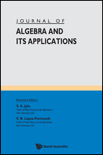
JOURNAL OF ALGEBRA AND ITS APPLICATIONS
Advancing Mathematical Knowledge Through Rigorous ResearchJOURNAL OF ALGEBRA AND ITS APPLICATIONS, published by WORLD SCIENTIFIC PUBL CO PTE LTD, stands as a pivotal resource for scholars in the fields of Algebra and Applied Mathematics. With an ISSN of 0219-4988 and E-ISSN 1793-6829, this journal has been providing a forum for the dissemination of cutting-edge research since its inception in 2008, converging towards a forward-looking timeline extending to 2024. As of 2023, it has earned a commendable Q2 ranking in both Algebra and Number Theory, as well as Applied Mathematics, reflecting its solid impact within the mathematical community. With a Scopus rank of #49/119 in Algebra and Number Theory, and #420/635 in Applied Mathematics, the journal captures significant advancements and applications across various mathematical domains. While it does not operate under an open access model, its comprehensive articles and research outputs are crucial for fostering intellectual dialogue and innovation in academia. Researchers, professionals, and students alike will find this journal an indispensable asset for their scientific pursuits and explorations into the vast field of mathematics.